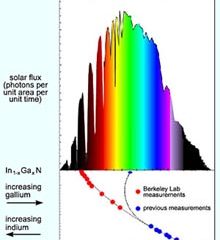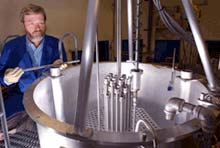This topic covers issues related to energy generation, conversion, transportation and consumption and how the industry is addressing the challenge of energy efficiency in general.
innovations-report provides in-depth and informative reports and articles on subjects ranging from wind energy, fuel cell technology, solar energy, geothermal energy, petroleum, gas, nuclear engineering, alternative energy and energy efficiency to fusion, hydrogen and superconductor technologies.

Researchers in the Materials Sciences Division (MSD) of Lawrence Berkeley National Laboratory, working with crystal-growing teams at Cornell University and Japan’s Ritsumeikan University, have learned that the band gap of the semiconductor indium nitride is not 2 electron volts (2 eV) as previously thought, but instead is a much lower 0.7 eV.
The serendipitous discovery means that a single system of alloys incorporating indium, gallium, and nitrogen can convert virtually the full spectru

A first in Canada, the Alberta Research Council (ARC) reached a milestone in the technical development of its own version of solid oxide fuel cell (SOFC) technology. ARC scientists are developing a proprietary micro solid oxide fuel cell (µ-SOFC) source of energy for small-scale portable applications such as laptops or personal digital assistants (PDAs).
“This is an important milestone as we pursue our strategic initiative in fuel cell technologies,” says John Zhou, manager, Advanced Materi

The “island effect” is one of the main problems in photovoltaic compound solar systems.
The doctoral thesis of Pablo Sanchis, presented in the Public University of Navarre (Basque Country), proposes three main contributions: the first one is a new control strategy of a booster inverter for autonomous systems; the second one is a new implementation of impedance measurement method, and the third one, a new methodology for the design of drift method in frequency, which guarantees with t

Recent experiments by Sandia National Laboratories researcher Gary Harms and his team are using a new Labs-built reactor to provide benchmarks showing that spent nuclear fuel — uranium that has been used as fuel at a nuclear power plant — is considerably less reactive than the original fresh fuel. This could mean significant savings in the eventual safe transport, storage, and disposal of nuclear waste.
“The conservative view has always been to treat spent fuel like it just came out of the

Oak Ridge National Laboratory and 3M Company are hoping for powerful results from a project aimed at making transmitting electricity more efficient and reliable.
Researchers from 3M, working with ORNL, are developing a promising replacement conductor for conventional power lines that addresses the problem of power outages caused by sagging lines. Lines sag under the heat of high current loads. The replacement conductor also avoids the high cost and environmentally harmful effects of buildin

A large study comparing trucks fueled by natural gas with others fueled by diesel found the natural gas vehicles produced only a quarter of the carbon monoxide emissions and half the oxides of nitrogen emissions of their diesel counterparts.
The study was conducted using package trucks operated by United Parcel Service (UPS), which has the nation’s largest private compressed natural gas (CNG) fleet. The study compared the operations, maintenance, performance, and emissions characteristics